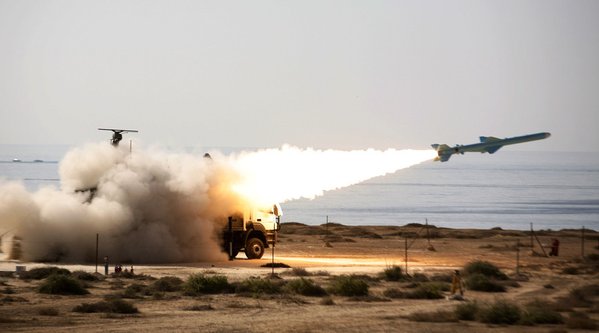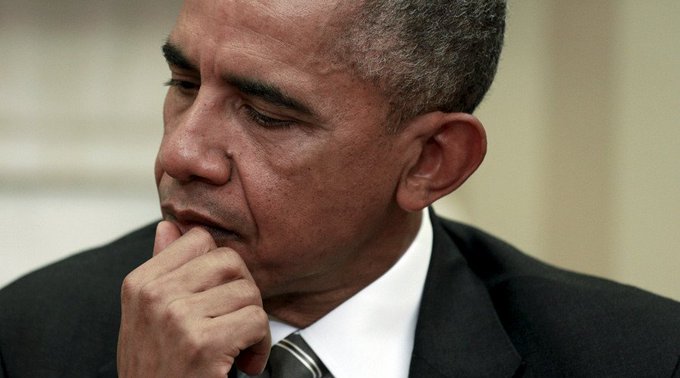A bolder, stronger Iran: Obama’s true legacy in the Middle East has yet to be written
Martin Jay is a veteran foreign correspondent now based in Beirut who works on a freelance basis for a number of respected British newspapers as well as Deutsche Welle TV. Previously he has worked in Africa and Europe for CNN, Euronews, CNBC, BBC and Reuters. Follow him on Twitter @MartinRJay

Barak Obama’s blunders in the Middle East are a collection of bewildering, illogical decisions that have led to Iran and Hezbollah becoming stronger than ever in what was once a region ruled by the Saudis and the US.
Obama’s true mark has yet to be made this year, with more conflict an inevitability after the appointment of Trump’s Iran-haters.
Confusion is a word that easily springs to mind when many in this part of the world talk about Obama’s legacy in the Middle East. But it wasn’t just his own policies that seemed incoherent with one another, but also his own idea of how the Middle East saw him – Obama could not decide on the Machiavelli conundrum of whether it is better to be feared or loved. It is as though he decided on neither, leaving a vast chasm open for regional intervention initially, rather than a global one, until Russia arrived in Syria in the late summer of 2015.
Iranian MPs vote to boost military spending, develop missile capabilities on.rt.com/7zwn
Yet, there are many failures in his term that can be chalked up as decision blunders, with the greatest one born from his predecessor’s decision to disband the Iraqi army shortly after the US invasion of 2003. This one alone can never be underestimated as a grave error – a milestone that others were to follow from Obama himself. If I had the chance to ask him only one question, it would be “Do you regret pulling US troops out of Iraq in 2008?” For this alone, could be argued, was a colossal mistake that further fueled the creation of what we now call ISIS or Daesh (Islamic State, formerly ISIL) in that country, and in Syria, of course.
But these singular mistakes can be forgiven, given the contexts and the shorter-term objectives of his administration and its policy goals. Let us not forget that Obama did not come in on a ticket that promised less drone attacks in Pakistan and Afghanistan – in fact, he increased them dramatically from George W. Bush. No, Obama came in on a pledge to bring troops out of Iraq and Afghanistan – itself a poisoned chalice that bore only pain, not gain, for the first black US President. It’s as though he was setting himself up for a fall with such a promise, but he badly wanted, like so many people in the Middle East, change – a completely new viewpoint on foreign policy.
Some argue that this radical overhaul on how Washington ran the Middle East can be traced back his appointment of Samantha Power, the firebrand Middle East advisor who once called the US “Nazi Germany” and slandered Hillary Clinton as a “monster,” as US ambassador to the UN. It was, after all, Power, who had campaigned to reform the UN earlier, but grew despondent with that particular cause and subsequently decided to join it. Power was never a great fan of Israel and wanted the intensity of the relationship with Washington to be downgraded. And, perhaps more poignantly, she never had the fear and loathing of Iran that was more or less the bedrock of her predecessors and, one could argue, of the main Trump appointments in the region today.
And so, she steered Obama down a path of reform in the region that has led to a number of policy decisions to date that don’t add up. Like, for example, arming Syrian rebels who fight for the downfall of Assad, while also thawing relations with Iran, the chief sponsor and geopolitical Big Brother of Syria.
But it is Iran and Hezbollah – or rather the Iranian sphere – which Obama will be remembered for by a great many Arabs in the region. Obama’s somewhat incoherent policies resulted in a greater intervention in Iraq by both US forces, who finally came back in the form of special forces, but also the Iranian military and infamous Shia militias who are currently doing all the really gruesome fighting in Mosul today.
Obama did the unthinkable – he not only signaled an entirely new era of putting up with Iran as the new superpower in the region, but actively encouraged it. Today, most Arabs will bemoan the fact that Iran and its allies are strengthening their grasp on the region. It is no accident that the recent appointment of a new President in Lebanon, who is allied to Iran’s proxy militant group, Hezbollah, which runs this tiny country, came during Obama’s time. The outgoing US president pushed for the Iran deal, which, contrary to what most Americans think, seeks to ultimately release Iran from crippling sanctions and unfreeze $100 billion of cash in the West. Bringing Iran in from the cold was supposed to shake up the region and signal an end to the status quo of Saudi Arabia more or less calling the shots on everything, with Israel very much being the closest of all allies. And he did that formidably.
Obama’s troubled exit: Temper tantrums & diplomatic storms (Op-Edge) on.rt.com/7zda
Today, Donald Trump has just appointed the two greatest adversaries of Iran that he could find as US defense chief and a new US ambassador to Israel – James Mattis and David Friedman – two individuals who probably agree with both Israel’s and Saudi Arabia’s views that Iran is a threat that has to be dealt with. But the new threat is no longer a military one, but an economic one, presenting an entirely new quandary for Washington, which can’t quite wrestle with the idea that Iran is a country with a modern, reformist group of people who clash with the old, conservative hardliners, unlike Saudi Arabia, which doesn’t show too many signs of ever allowing reform to come from its citizens, rather than a drip feed token model that is spurned by its elite. Iran is progressing. And that is a new problem in itself. And it’s all Obama’s fault.
With Iran’s growing economy set to reach at least five percent growth – and $50 billion of investment expected to pour in – the country’s geopolitical strategies can expand also. The war in Syria is more or less over, and that, of course, has a lot to do with Russia coming to Assad’s aid with military hardware and soldiers. But we should never forget that the fall of Aleppo is not only a victory for the Assad regime, but, more importantly, the spoils of war for Hezbollah, which also benefits from Obama’s Midas touch, and whose leader recently underlined in a speech that the West can now “forget about toppling the Syrian regime.”
The Lebanese Shia group’s experience in Syria has dramatically improved its battlefield kudos, and everyone knows where this is leading: an inevitable war at some point with Israel. It’s hardly a secret that the US has been in talks with Hezbollah, with some reports claiming that British diplomats are being used as go-betweens so that no US laws are broken. But who would have thought that, as sources within the intelligence community have told me, that US satellite photos of ISIS positions would be shared with the Lebanese group, who recently drew the wrath of American journalists when US made military troop carriers were found to be in their hands in Syria.
Given that Iran and its allies are stronger, better equipped, richer, and want to enhance their influence in the region, the Trump team that takes office already has a number of nightmare scenarios coming its way, with probably a new conflict emerging in Gaza when the 50-year anniversary of the occupation reaches fever pitch in the blistering summer heat in June of this year. Similarly, ISIS and Al Qaeda are expected to move to Yemen and Libya, while tensions between Israel and Hezbollah boil, as the latter boasts of “thousands” of new grade rockets aimed at Tel Aviv – a footnote of a speech that years earlier the Hezbollah leader would not have been able to make, but now asserts proudly, while making sure to no longer run down Uncle Sam, his new chum who made all of this possible.
Martin Jay is a journalist based in Beirut who recently won the UN’s prestigious Elizabeth Neuffer Memorial Prize (UNCA) in New York, for his Middle East work. He can be followed at @MartinRJay






0 Comments:
Post a Comment
Subscribe to Post Comments [Atom]
<< Home